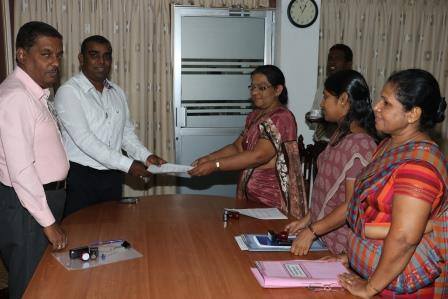In June 2014, Mr. Subaskaran Allirajah, founder and chairman of Lycamobile, Mrs.Gnanambikai Allirajah along with Co-Founder Mrs.Prema Subaskaran visited Sri Lanka to open 9 Gnanam Foundation district branch offices. During his visit, he assured the Poonthoddam IDP’s that he will support the construction of permanent shelter for them to resettle in the near future with the close coordination of all relevant government authorities.
Vavuniya District Management consider the Poonthoddam IDP issue as one of the major problems they face. As a result, the District Secretary Mr. M.K Bandulla Harischandra and Vavuniya District Secretariat planning division team coordinated all the initial preparation work such as the identification of suitable land for relocation, jungle clearing, the allocation of land for each family and the coordination with other government departments for the provision of other infrastructure facilities such as electricity and roadways to the land selected for relocation.
After completing all the preparation work, the Ministry of Resettlement, Hindu Relations Affairs and Lyca’s Gnanam Foundation signed a Memorandum of Understanding (MOU) for the construction of 150 Nos permeant houses all with basic facilities including toilet facilities to be constructed at Sinnaadampan in the Vavuniya district for the relocation of 150 families of the Poonthoddam refugee camp.
This historical event concludes the IDP issues of Poonthoddam which has been in existence for the past 30 years. The relocation programme also incorporates sustainable livelihood activities to ensure Poonthoddam IDPs are provided with sufficient income generation in the resettlement village. The Sinnaddpaan Rasipuram village, with many other facilities such as a primary school, dispensary and religious places is a more suitable place for relocation.
The Poonthoddam IDP’s and many other community members of Vavuniya district express gratitude to Mr.Subashkaran Allirajah for his long term vision of supporting the communities of Sri Lanka who are most in need. Those who have faced many hardships in the past are now supported well, can revitalise their live, live a dignified life and be recognised members of this modern society.








